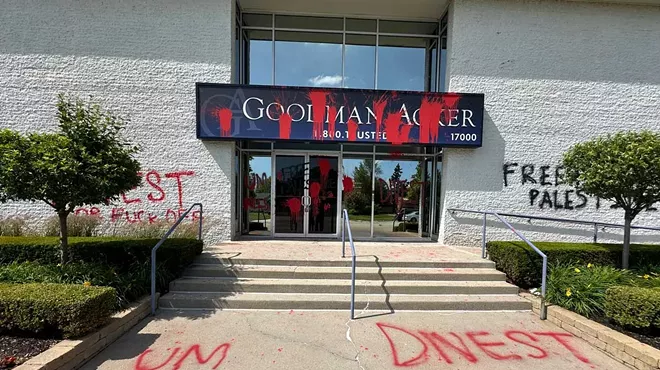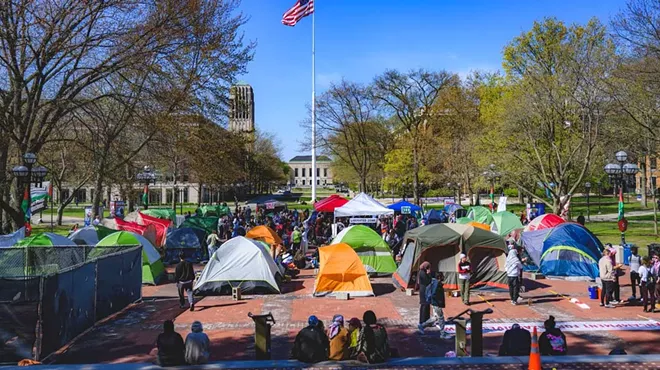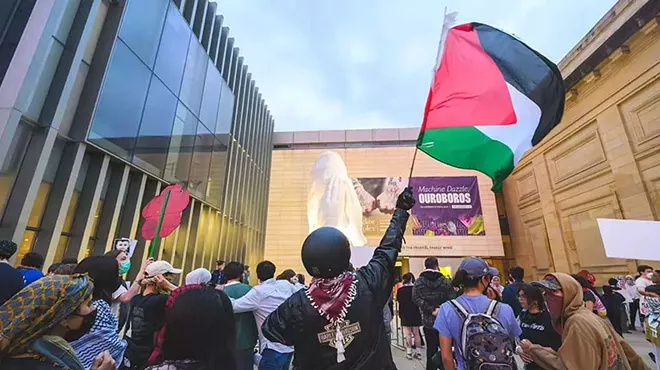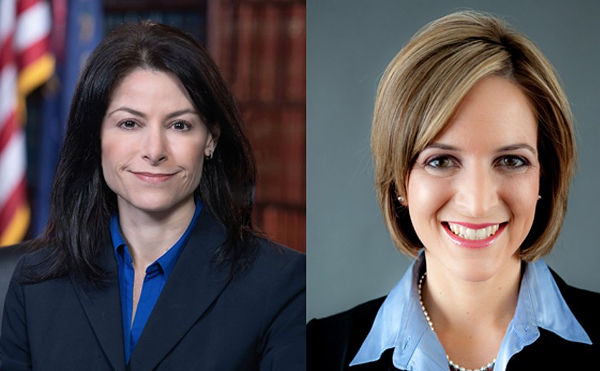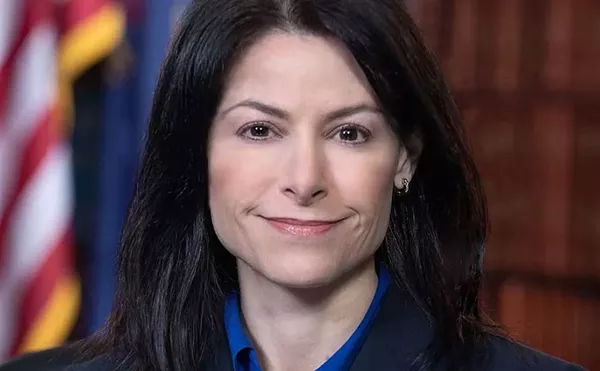Raids on Pro-Palestinian activists in Michigan raise fears of political targeting
Attorneys of those targeted say the raids were heavy-handed and intended to stifle dissent on campus

Audio By Carbonatix
[
{
"name": "GPT - Leaderboard - Inline - Content",
"component": "35519556",
"insertPoint": "5th",
"startingPoint": "3",
"requiredCountToDisplay": "3",
"maxInsertions": 100,
"adList": [
{
"adPreset": "LeaderboardInline"
}
]
}
]
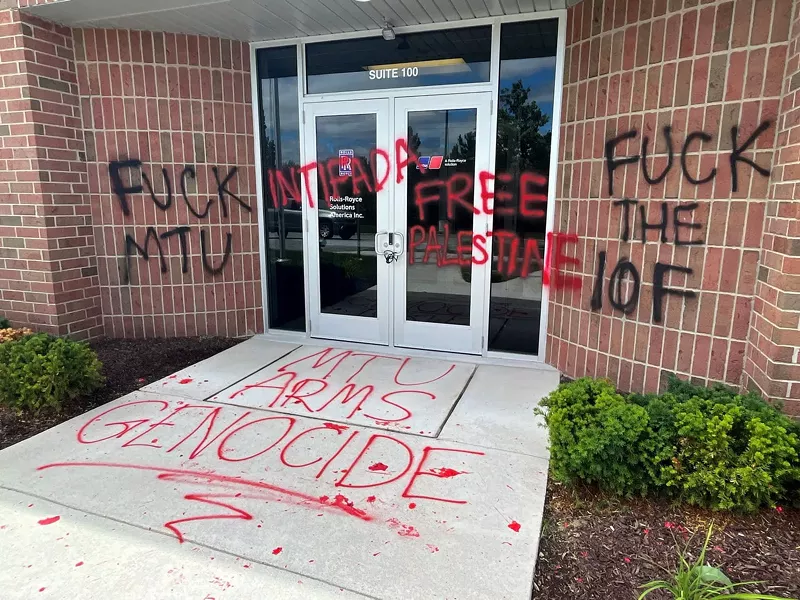
Civil rights attorneys and activists are raising alarms after Michigan Attorney General Dana Nessel’s office led a series of raids targeting pro-Palestinian protesters from the University of Michigan, in what they view as a politically motivated crackdown on free speech.
On Wednesday morning, FBI agents and local police officers arrived in unmarked vehicles at several homes in Ann Arbor, Ypsilanti, and Canton, executing search warrants tied to what authorities describe as “coordinated criminal acts of vandalism” across Southeast Michigan. Nine people were detained but later released. No charges have been filed.
The raids are part of an expansive investigation into nearly a dozen incidents that date back to February 2024, including acts of vandalism on campus, at the homes of University of Michigan officials, and at private businesses. The attorney general’s office said the damage totals about $100,000 and involved smashed windows, chemical substances, and graffiti with political slogans like “Free Palestine.”
The investigation, however, is facing intense scrutiny from attorneys, civil rights advocates, and students who argue the raids were unnecessarily aggressive, lacked clear probable cause, and were designed to intimidate young activists advocating for Palestinian rights.
Attorneys representing some of those targeted said the raids were heavy-handed and politically charged, intended to stifle dissent on campus.
“This is a clear criminalization of free speech,” Amir Makled, an attorney representing several of the students, tells Metro Times. “The tactics that have been used — felony charges, raids, and a strong showing of force — are intimidation tactics to stop pro-Palestinian speech happening across Michigan campuses.”
Law enforcement officers not only confiscated phones and computers belonging to the individuals listed in the warrants but also seized electronic devices from others present at the homes, including parents and friends who were not suspected of any wrongdoing. Attorneys called it a “fishing expedition.”
“They have taken the devices of any and all persons in that house, whether they were listed as targets of the investigation or not,” Makled says.
Staff attorney Amy V. Doukoure of CAIR-MI, a Muslim civil rights organization, says the actions by the AG’s office and federal agents were “heavy-handed and unnecessary,” noting that most of the alleged acts of vandalism would likely constitute misdemeanors.
Doukoure compared the raids to law enforcement’s inaction during other events, such as the University of Michigan football celebrations in January 2024, when drunken revelers caused significant property damage, including setting more than 20 fires, in Ann Arbor.
“They created a substantial amount of property damage in Ann Arbor and on the University of Michigan campus. Not a single person was arrested,” Doukoure tells Metro Times. “Where was the attorney general’s interest in stopping crime and malicious destruction of property then?”
Further concerns have been raised about the judicial handling of the search warrants. All of the warrants were signed by 53rd District Court Judge Michelle Friedman Appel, even though only one of the alleged incidents occurred within her district.
Social media posts from a Facebook account belonging to Appel sparked questions about potential bias. In September 2024, a comment made under her account appeared to criticize a pro-Palestinian kite-flying event “to offer hope to the children of Gaza.”
“Hamas has flown kites into Israel from gaza designed to start fires,” Appel’s comment read. “These kites have started major fires in areas of Israel near Gaza.”
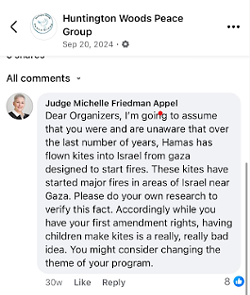
The account then added, “While you have your first amendment rights, having children make kites is a really, really bad idea. You might want to consider changing the theme of your program.”
Although the account later stated the comment was made by her husband, the incident has fueled doubts about impartiality.
Attorneys argue the use of a single judge across multiple jurisdictions suggests authorities were “cherry-picking” for a favorable outcome.
Wednesday’s raids come amid a wider crackdown against pro-Palestinian advocacy at the University of Michigan. In February, the Sugar Law Center for Economic and Social Justice and the ACLU of Michigan filed a federal lawsuit against the University of Michigan, arguing that campus bans against protesters violated their First and Fourteenth Amendment rights.
Meanwhile, U-M President Santa Ono and university regents have come under fire for not only resisting protesters’ demands that the school divest from Israeli-linked institutions but doubling down on the investments.
“My response and the board’s response to this call to divest and to cut those relationships was to actually invest even more,” Ono said while speaking at an Anti-Defamation League conference in Manhattan, adding, “great things have come out of these relationships, and more great things will come in the future.”
In May 2024, Danielle Hagaman-Clark, the chief of the AG’s Criminal Bureau, wrote a letter offering the university assistance with prosecutions stemming from campus protests. The letter touted the AG’s office as “ideally situated” to take on these cases, promising the “best legal minds and talented litigators” would handle the investigations.
Critics say the letter reveals a troubling level of cooperation between the university’s administration and the attorney general’s office in seeking harsher penalties against students engaged in political protest.
“This was forum shopping,” says Makled, pointing out that the Washtenaw County Prosecutor’s Office declined to charge most of the protesters, while Nessel’s office charged nine of them.
Makled and others argue that Nessel’s actions reflect selective prosecution, pointing to her previous recusal from a politically sensitive case involving Arab American leaders in Hamtramck due to concerns over bias.
A motion recently filed by Makled on behalf of a student charged during a pro-Palestinian protest asks a judge to disqualify Nessel’s office from the case, arguing that her public comments and previous actions demonstrate political bias that precludes a fair prosecution.
“The Attorney General’s actions, statements, and selective use of prosecutorial authority betray the neutrality that justice requires in this case,” the motion argues.
John Philo, an attorney with the Sugar Law Center, says the raids were “very clearly intended to influence the content of debate on the University of Michigan campus,” noting that the students targeted were academically successful and had no criminal histories.
In some cases, law enforcement collected DNA samples from students using cotton swabs, despite none of them being arrested or charged.
None of the students have yet been formally charged in connection to the raids, and none have been told when — or if — their seized belongings will be returned.
The response from civil rights organizations has been swift. Progress Michigan described the raids as an excessive use of force “compounding the fear spread by the Trump administration,” while encouraging students and activists to familiarize themselves with their rights.
Philo says the AG’s actions appear intended to freeze free speech.
“This looks like an effort to scare students and young people into silence,” Philo tells Metro Times. “It’s not about vandalism anymore. It’s about suppressing political speech.”
The attorney general’s office, which did not immediately respond to a request for comment, has defended its investigation as lawful and necessary.
But for many students and advocates, the raids have sent a chilling message about the cost of dissent.
“They’re making an example out of us,” says one student, who asked to remain anonymous for fear of retaliation. “They want everyone to be afraid.”

